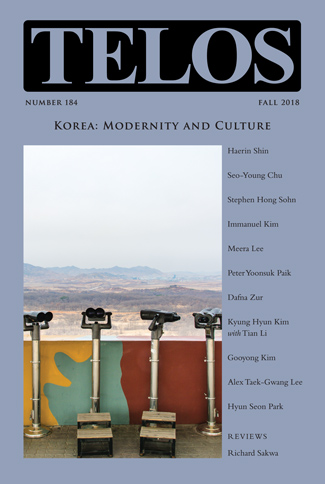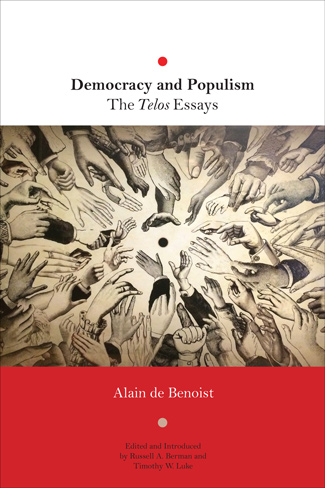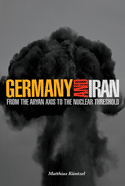By Jack Robert Edmunds-Coopey · Wednesday, October 3, 2018 As an occasional feature on TELOSscope, we highlight a past Telos article whose critical insights continue to illuminate our thinking and challenge our assumptions. Today, Jack Robert Edmunds-Coopey looks at Damien Booth’s “Hegel’s Philosophy of Physics and Kant’s Noumena” from Telos 179 (Summer 2017).
Damien Booth’s article “Hegel’s Philosophy of Physics and Kant’s Noumena” addresses Hegel’s critique of Kant concerning the positing of the noumena, the realm beyond the sensible, which for Hegel results in entanglements and contradiction, Kantian antinomies that the dialectic could resolve. While the article appears to be an exposition of the contradiction of Kant’s noumena and its critique in Hegel, Booth turns to Adorno and Heidegger to accentuate the relevance of Kant’s modern project of philosophy and Hegel’s critique.
Continue reading →
By Haerin Shin · Monday, September 24, 2018 Telos 184 (Fall 2018), a special issue on Korea, edited by Haerin Shin, is now available for purchase in our store.
 While Korea’s history as a modern nation-state has always been a tumultuous reel of socio-political unrest, never has it drawn the globe’s attention to the degree and extent to which the press coverage of the past two years attests. South Korea’s candlelight demonstrations in the fall of 2016 were widely regarded as a newly arisen form of celebratory civil protest culture, and news of the progressive party’s subsequent rise to power stood out amid the global turn toward conservative politics. Meanwhile, with North Korea’s nuclear threat becoming a palpable reality, media outlets began clamoring with predictions of a major military outbreak across the Pacific. (I remember being inundated by concerned emails from acquaintances abroad during my breaks in South Korea last year.) Then came the dramatic shift toward prospects of denuclearization and North–South collaboration this past summer. Millions watched in awe as Kim Jong Un took President Moon’s hand and walked over the Military Demarcation Line. The meeting in Singapore was viewed with skepticism in the United States, but more pertinently such attempts to reestablish channels of communication were greeted warmly in South Korea. While Korea’s history as a modern nation-state has always been a tumultuous reel of socio-political unrest, never has it drawn the globe’s attention to the degree and extent to which the press coverage of the past two years attests. South Korea’s candlelight demonstrations in the fall of 2016 were widely regarded as a newly arisen form of celebratory civil protest culture, and news of the progressive party’s subsequent rise to power stood out amid the global turn toward conservative politics. Meanwhile, with North Korea’s nuclear threat becoming a palpable reality, media outlets began clamoring with predictions of a major military outbreak across the Pacific. (I remember being inundated by concerned emails from acquaintances abroad during my breaks in South Korea last year.) Then came the dramatic shift toward prospects of denuclearization and North–South collaboration this past summer. Millions watched in awe as Kim Jong Un took President Moon’s hand and walked over the Military Demarcation Line. The meeting in Singapore was viewed with skepticism in the United States, but more pertinently such attempts to reestablish channels of communication were greeted warmly in South Korea.
Continue reading →
By Fabrice Balanche · Friday, September 14, 2018 With the re-establishment of Bashar al-Assad’s power in Syria, the strengthening of Hezbollah in Lebanon, and finally the political and military victory of pro-Iranian forces in Iraq, it is clear that an Iranian axis now prevails in the Levant. The strength of this geopolitical axis is reinforced by the territorial continuity between Tehran and Beirut via Damascus and Baghdad: “the Iranian land bridge” or “Iranian corridor,” controlled by Iranian troops directly and by proxies. Since the Shia militias joined the Syrian-Iraqi border in May 2017, the Iranian land bridge has continued to expand, despite the U.S. troop presence on both sides, in the al-Tanef pocket and in northeastern Syria. Until spring 2017, the West seemed incredulous about this reality. However, at that time, it was already too late to block the Shiite militias in eastern Syria, and the Iranian land bridge became a reality.
Continue reading →
By Paul Grenier · Friday, September 7, 2018 Are the divisions that fragment the United States primarily driven by some deep flaw in its political life, or was the United States doing just fine, thank you very much—until Russia came along during the 2016 presidential race and started sowing division and dissension?
Framed that way, the question answers itself. Whatever some state-sanctioned Russian actors may have done to pester the American political process, it is obvious that America’s deep divisions exist for reasons having essentially nothing to do with Russia. They long precede the last election.
Even if Russia’s interventions into American electoral politics turn out to be more significant than they presently appear, this cannot change the more fundamental reality that our confrontational posture, including vis-à-vis Russia, is by no means something external to the United States’ Lockean liberal political concept.
Continue reading →
By Telos Press · Saturday, September 1, 2018 New from Telos Press: Democracy and Populism: The Telos Essays, by Alain de Benoist. Edited by Russell A. Berman and Timothy W. Luke. Order your copy in our online store, and save 20% on the list price by using the coupon code BOOKS20 during the checkout process.
 The crisis of democracy, the consequences of neoliberalism and globalization, the limits of sovereignty, and of course the rise of populism: few thinkers have given more sustained attention to these matters than the French author Alain de Benoist. Democracy and Populism collects de Benoist’s essays from the journal Telos, where many of his writings first appeared in English translation. Reading de Benoist in Telos provides access to a distinctive transatlantic intellectual dialogue and to an array of prescient insights into the current political condition on both continents. De Benoist clearly anticipated today’s political condition: the critique of neoliberalism, the contradictions in liberalism created by the postcolonial frictions of identity politics, and the implications of a resurgent populism. The specific forms of populist movements are sure to vary in the coming years, but the crisis of liberal democracy will remain the defining feature of political life for the foreseeable future. De Benoist explains why. The crisis of democracy, the consequences of neoliberalism and globalization, the limits of sovereignty, and of course the rise of populism: few thinkers have given more sustained attention to these matters than the French author Alain de Benoist. Democracy and Populism collects de Benoist’s essays from the journal Telos, where many of his writings first appeared in English translation. Reading de Benoist in Telos provides access to a distinctive transatlantic intellectual dialogue and to an array of prescient insights into the current political condition on both continents. De Benoist clearly anticipated today’s political condition: the critique of neoliberalism, the contradictions in liberalism created by the postcolonial frictions of identity politics, and the implications of a resurgent populism. The specific forms of populist movements are sure to vary in the coming years, but the crisis of liberal democracy will remain the defining feature of political life for the foreseeable future. De Benoist explains why.
Continue reading →
By Telos Press · Friday, August 31, 2018 In a new opinion piece in the Jerusalem Post, Sean Durns discusses Matthias Küntzel’s Germany and Iran: From the Aryan Axis to the Nuclear Threshold, published by Telos Press. Pick up your copy of Germany and Iran in our online store, and save 20% with the coupon code BOOKS20.
 As the German historian Matthias Küntzel detailed in his 2014 book, Germany and Iran: From the Aryan Axis to the Nuclear Threshold, close ties between the two countries go back to the pre-World War I era. As the German historian Matthias Küntzel detailed in his 2014 book, Germany and Iran: From the Aryan Axis to the Nuclear Threshold, close ties between the two countries go back to the pre-World War I era.
In the late 19th century, Persian hopes for industrial development hinged on German know-how and technological prowess. After the ascension of Kaiser Wilhelm II in 1888, “economic relations between the two countries began to expand swiftly” and “it became fashionable for young Persian intellectuals to be pro-German,” Küntzel notes.
Continue reading →
|
|





